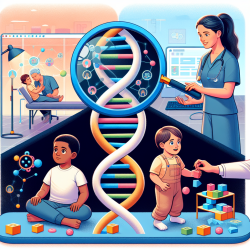Understanding the Impact of FBXW11 Variants on Developmental Disorders
In the realm of pediatric therapy, understanding the genetic underpinnings of developmental disorders is crucial for tailoring effective interventions. Recent research published in the American Journal of Human Genetics sheds light on the role of de novo missense variants in the FBXW11 gene, which are linked to a spectrum of developmental anomalies, including brain, eye, and digit malformations.
The Role of FBXW11 in Development
FBXW11 encodes an F-box protein that is a part of the Skp1-cullin-F-box (SCF) ubiquitin ligase complex, which is essential for protein regulation through ubiquitination and proteasomal degradation. This gene is involved in critical signaling pathways, such as Wnt and Hedgehog (Hh), which are vital for the development of neurological, ocular, and digital structures.
Research Findings: A Closer Look
The study identified seven individuals with diverse developmental phenotypes, all possessing unique de novo missense variants in FBXW11. These variants were not present in the general population database, gnomAD, highlighting their rarity and potential significance. The phenotypic manifestations included neurodevelopmental delays, speech and language impairments, and various physical anomalies.
Implications for Practitioners
For practitioners, this research underscores the importance of genetic screening in diagnosing and managing developmental disorders. Understanding the specific genetic variants that contribute to a child's condition can guide the customization of therapeutic interventions. This is particularly relevant for speech-language pathologists who can tailor their approaches based on the genetic profile of their patients.
Encouraging Further Research
While the study provides significant insights, it also opens the door for further exploration. Practitioners are encouraged to consider participating in genetic research initiatives and to stay informed about emerging genetic findings that could impact therapeutic strategies.
Conclusion
The identification of FBXW11 variants as contributors to developmental disorders is a promising development in pediatric therapy. By integrating genetic insights into practice, therapists can enhance their intervention strategies, ultimately improving outcomes for children with developmental challenges.
To read the original research paper, please follow this link: De Novo Missense Variants in FBXW11 Cause Diverse Developmental Phenotypes Including Brain, Eye, and Digit Anomalies.










